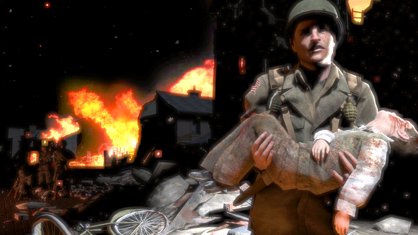A Modest Proposal
Gearbox's Randy Pitchford proposes a solution to the "violence in games" problem
We love videogames. Well, I know I love videogames. I imagine you love videogames, too, because you’re reading this site, after all.
But we get it—we know that games are fun and safe, no matter how edgy the content is. And yet there are people—a lot of them—who are terrified that videogames will turn us all into violent, demented serial killers.
With respect to media and entertainment, videogames have us embroiled in the largest generation gap in the history of the world. Sure, there was a problem with books back in the dark ages. Some folks in charge probably thought, “Damned kids with their books…they’re going to get IDEAS! What if those ideas are BAD?!? We better make sure this book thing doesn’t catch on!” And so, there were various times in history when books were banned or controlled or limited or censored by the powers that be.

Brothers in Arms: Hell’s Highway involves violence and real human drama—elements you can find in most classic literature. Take that, game critics!
In more recent times, we had trouble with rock music. While today we’ll laugh at “My Humps” and enjoy it for what it is, there was a time when state governments actually banned radio stations from playing “Louie Louie” because they were worried about what they thought was innuendo. By today’s standards, “Louie Louie” compared to “My Humps” would be like comparing the violence of a low-resolution bomb explosion in Windows’ Minesweeper to the gory skull-fragmenting headshots in Brothers in Arms: Hell’s Highway.
So we’ve been there as a culture. The concept of a generation gap with new types of entertainment isn’t new to us, and we’re not surprised by it. But the key difference between the generation gap with rock music and the generation gap with videogames is that in the case of rock music, the older generation had a problem with the content, not the medium. At least the older generation understood what music was. My grandparents, for example, loved big band music and classical music, but made it clear when I was young that they didn’t have much respect for, say, heavy metal. So, as a generation, the problems with rock music were not about the medium, just about the content. The fear was of the ideas, not of the medium itself.
Meanwhile, there are people in today’s world who believe that videogames are worse than worthless—they actually believe that they are evil and bring harm. These people are afraid of more than just ideas—they are afraid of behavior. They are afraid of us and what they think we might do. It sounds preposterous, but I think they’re afraid that we might kill them because the games are brainwashing us.
We, of course, know that this total absurdity. We know that they are short-sighted, narrow-minded, out-dated, insecure control freaks. Well, not my grandparents, but the rest of them :)
But there are solutions, for the short term and the long term. The short term solution takes some effort, but it worked with rock ‘n’ roll and it will work now: express your opinion with your dollar, your voice, and your vote. Buy what you want (capitalism and the market wins), and e-mail your congressional representative to and let him or her know that you’re going to vote out of office anyone who does anything to censor or ban videogames.
The long-term solution is a little harsh, but it works itself out automatically: just to wait it out, because people eventually die. New people are growing up with videogames as part of their lives…and old people can’t hang around forever.
Someday, we’ll elect a President of the United States of America who has a gamertag. It’s inevitable. And when that eventually happens…well, that’s when we’ll have won.
July 31, 2008
Sign up to the GamesRadar+ Newsletter
Weekly digests, tales from the communities you love, and more


